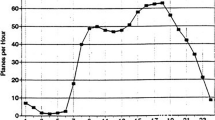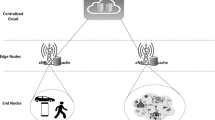Abstract
PRMA (packet reservation multiple access) is a reservation-ALOHA access protocol specifically designed for wireless microcellular networks that handle both real-time and non-real-time traffic. We present a thorough analysis of this protocol, considering real-time traffic only, based on a suitable Markov model. The size of the model is such that it can be directly used for an exact quantitative analysis of the system. In particular, we are able to analyze the packet dropping process, by evaluating both average and distribution measures. The latter are particularly useful to characterize the degradation caused to real-time traffic (e.g., voice) by the loss of consecutive packets. Besides, we also derive from the Markov model a qualitative analysis of the system stability, based on the equilibrium point analysis (EPA) technique. By this technique, we characterize the system stability and analyze the effect on it of several system parameters (e.g., load, permission probability).
Similar content being viewed by others
References
H.S. Bradlow, Performance measures for real-time continuous bit-stream oriented services: Application to packet reassembly, Computer Networks and ISDN Systems 20(1) (1990) 14–26.
W. Crowther, R. Rettberg, D. Walden, S. Ornstein and F. Heart, A system for broadcast communication: reservation ALOHA, in: Proc. 6th Haway Int. Conf. Syst. Sci. (January 1973) pp. 371–374.
D.J. Goodman, Cellular packet communications, IEEE Transactions on Communications 38 (August 1990) 1272–1280.
D.J. Goodman, R.A. Valenzuela, K.T. Gayliard and B. Ramamurthi, Packet reservation multiple access for local wireless communication, IEEE Transactions on Communications 37(8) (August 1989) 885– 890.
L. Kleinrock and S. Lam, Packet switching in a multiaccess broadcast channel: Performance evaluation, IEEE Transactions on Communications 23(4) (April 1975).
S. Jangi and L. Merakos, Performance analysis of reservation random access protocols for cellular packet communications, IEEE Transactions on Communications 42 (August 1994) 1223–1234.
L. Merakos and S. Jangi, Voice packet and data integration in reservation random access protocols for wireless access networks, in: Proc. GLOBECOM’ 91, Phoenix (December 1991) pp. 895–899.
S. Nanda, Stability evaluation and design of the PRMA joint voice data system, IEEE Transactions on Communications 42(5) (May 1994) 2092–2104.
S. Nanda, D.J. Goodman and U. Timor, Performance of PRMA: A packet voice protocol for cellular systems, IEEE Transactions on Vehicular Technology 40(3) (August 1991) 584–598.
S. Tasaka, Stability and performance of the R_ALOHA packet broadcast system, IEEE Transactions on Computers 32(8) (August 1983) 717–726.
S. Tasaka, Performance Analysis of Multiple Access Protocols (MIT Press, 1986).
M.E. Woodward, Communication and Computer Networks (IEEE Computer Society Press, 1994).
G. Wu, K. Mukumoto and A. Fukuda, Analysis of an integrated voice and data transmission system using packet reservation multiple access, IEEE Transactions on Vehicular Technology 43(2) (May 1994) 289–297.
Author information
Authors and Affiliations
Rights and permissions
About this article
Cite this article
Lo Presti, F., Grassi, V. Markov analysis of the PRMA protocol for local wireless networks. Wireless Networks 4, 297–306 (1998). https://doi.org/10.1023/A:1019164625320
Issue Date:
DOI: https://doi.org/10.1023/A:1019164625320




